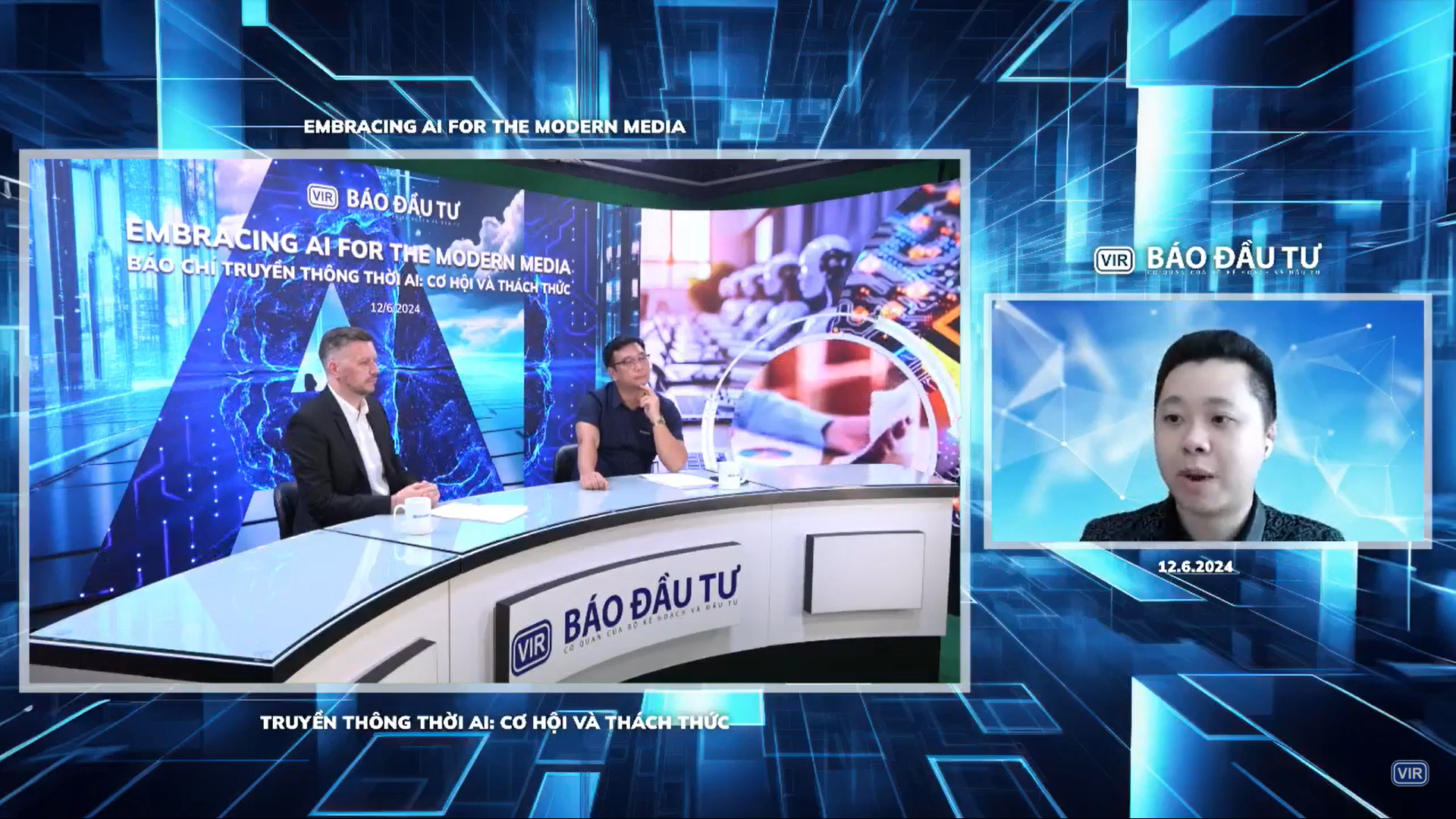AI an inevitable trend for press and media agencies
 |
The information was discussed at a VIR talk show themed "Embracing AI for the Modern Media" on June 12. The talk show was part of the celebrations for the 99th anniversary of Vietnam Journalists' Day and shed light on the rapid and powerful digital transformation in the press and media that is being driven by AI.
Commenting on Vietnam’s media and digital transformation landscape, Do Anh Duc, dean of the Multimedia Department at the School of Journalism and Communication, University of Social Sciences and Humanities, said, “In Vietnam, there are government guidelines for almost everything, including media and digital transformation. The government has also set up a national strategy for media digital transformation with a vision for 2030. According to the strategy, media agencies in Vietnam will have to switch to digital and reconstruct their newsrooms towards digital conversion. All media agencies have to provide news and content on digital platforms like Facebook, Instagram, and Tik Tok.”
In addition, the strategy outlines goals for university education in journalism and communications to retrain the media workforce and equip them with digital skills. Meanwhile, media agencies will have to increase revenue by 20 per cent in the next five years. This goal aims to encourage media agencies to try their best to keep up with cutting-edge technologies, he added.
Tran Dinh, head of the Fintech Committee at the Vietnam Blockchain Association, said, “Blockchain technology is not widely applied in journalism, but it holds significant potential for many applications. There is a possibility to apply blockchain for content distribution in journalism, as many video and photo creators create content based on blockchain. Meanwhile, many news agencies are attracting users through micropayments, which are also supported by blockchain. News agencies can offer membership subscriptions with bitcoin or cryptocurrency. Blockchain also enhances authentication for video and photo content to avoid fake news.”
Dr. Long Nguyen, associate programme manager for professional communications at RMIT Vietnam, pointed out some key strategies that media agencies can use to integrate technology to boost sales and marketing management. “First is personalisation, as data analysis is now powerful. With AI-powered tools, media agencies can easily understand readers’ preferences and deliver personalised content. The media should take advantage of their readers’ data to explore their preferences, the time they spend reading the news, and their favourite sections like sports, business, or politics. With these insights, media agencies can apply customised news feeds and push notifications for relevant content to targeted readers.”
“There is also a lot of innovation in content formats, and media agencies can try to utilise technology to develop new formats. For example, virtual reality and augmented reality can be combined with storytelling techniques and different kinds of interactive formats to make news less boring,” he added.
From the perspective of a media agency, Nguyen Thanh Son, chairman of MVV Group, said, “We have made investments to explore AI opportunities for the last five years. We can’t wait for the guidance of the government on digital transformation. We see AI as a labour force that we need to utilise.”
According to Son, content creation is not just about the production. Actually, it covers certain processes, including the discovery phase to study the audience's insights. AI is excellent at data analysis to complete the discovery phase.
In the design phase, media agencies focus on designing the structures and channels of content. AI, especially generative AI, and humans can collaborate to complete this phase. However, in the production phase, AI has to compete with humans to develop content. In general, AI can cover a lot of things in journalism, from personalising content to automating writing, but it can not replace journalists, especially the professional ones.
 | AI explosion raises questions for press and media production AI can facilitate the smoother management of press and media operations, driving both results and performance, but the slow application of such tech also poses the risk of increased costs from old processes. This is creating a new challenge for Vietnamese press agencies and traditional media in the AI era. |
 | Young journalists make efforts for gender equality With the role of shaping public opinion and creating social progress, young journalists and communications officers need to be the pioneers of gender equality. It is necessary for them to have the right and objective perspectives to avoid unintentionally reinforcing gender stereotypes. |
 | Journalists’ Day congratulations With Vietnam Journalists’ Day on June 21, business leaders have shared their feelings about the role of the press in growth and the country’s economic arena, and their expectations of how journalists can make more contributions to driving Vietnam’s next stage of development. |
What the stars mean:
★ Poor ★ ★ Promising ★★★ Good ★★★★ Very good ★★★★★ Exceptional
Related Contents
Latest News
More News
- Tet event in Japan celebrates success of 14th National Party Congress (January 25, 2026 | 10:04)
- 14th National Party Congress wraps up with success (January 25, 2026 | 09:49)
- Congratulations from VFF Central Committee's int’l partners to 14th National Party Congress (January 25, 2026 | 09:46)
- List of newly-elected members of 14th Political Bureau announced (January 23, 2026 | 16:27)
- 14th Party Central Committee unanimously elects To Lam as General Secretary (January 23, 2026 | 16:22)
- List of members of 14th Party Central Committee announced (January 23, 2026 | 09:12)
- Highlights of fourth working day of 14th National Party Congress (January 23, 2026 | 09:06)
- Press provides timely, accurate coverage of 14th National Party Congress (January 22, 2026 | 09:49)
- Press release on second working day of 14th National Party Congress (January 22, 2026 | 09:19)
- Minister sets out key directions to promote intrinsic strength of Vietnamese culture (January 22, 2026 | 09:16)

 Tag:
Tag:


















 Mobile Version
Mobile Version